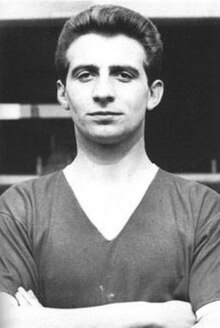David Pegg
This article needs additional citations for verification. (October 2018) |
 Pegg in 1956 | |||
| Personal information | |||
|---|---|---|---|
| Date of birth | 20 September 1935 | ||
| Place of birth | Highfields, West Riding of Yorkshire, England | ||
| Date of death | 6 February 1958 (aged 22) | ||
| Place of death | Munich, West Germany | ||
| Position(s) | Outside left | ||
| Youth career | |||
| Manchester United | |||
| Senior career* | |||
| Years | Team | Apps | (Gls) |
| 1952–1958 | Manchester United | 127 | (24) |
| International career | |||
| England U23 | 3 | (?) | |
| 1957 | England | 1 | (0) |
| *Club domestic league appearances and goals | |||
David Pegg (20 September 1935 – 6 February 1958)[1] was an English footballer and one of the eight Manchester United players who lost their lives in the Munich air disaster on 6 February 1958.
He was born in Highfields near Doncaster in the West Riding of Yorkshire, in September 1935, one of three children born to miner William Pegg and his wife Jessie. His father also played amateur football to a high standard during the 1930s, winning a number of trophies with local football teams.
He signed for United on leaving school in 1950 and made his first team debut in the Football League First Division against Middlesbrough on 6 December 1952, aged 17.
He was the club's first-choice outside left until the final few months before the disaster (when he was displaced by Albert Scanlon) and had collected two League Championship winner's medals in the two seasons leading up to the Munich air disaster. He also helped them reach the European Cup semi-finals twice. His performance against Real Madrid in the 1956-57 semi-finals reportedly inspired the Spanish giants to sign a new left-back specifically to combat Pegg's talents in the future, although his death less than a year later meant that he never played against them again.
He was capped once for the England national football team, his solitary appearance coming in 1957,[2] and was tipped by many to succeed Tom Finney in the England team. Still only 22 years old when he died, he was one of the youngest people to die out of the 23 who lost their lives at Munich.
He was born in the village of Highfields, north of Doncaster and he was buried in the nearby Redhouse Cemetery. A memorial chair was dedicated in his memory at St. George's Church in Highfields and when that church was closed the chair was moved to All Saints' Church in Woodlands which now serves both villages.
Pegg's sister, Irene Beevers, contributed to a 1998 ITV documentary, The Busby Babes: End of a Dream, which commemorated the 40th anniversary of the tragedy. She, Pegg's brother and Pegg's other sister, Doreen Robinson (who now lives in Australia) visited the scene of the Munich air crash in September 2005, on what would have been his 70th birthday, to pay tribute to their brother.[3]
He was also outlived by both of his parents, though they have both since died; his father died in 1980 and his mother in 2006. They are both buried alongside him.[citation needed]
References
- ^ "England players: David Pegg". englandfootballonline. 29 December 2013. Retrieved 3 October 2018.
- ^ "David Pegg". englandstats. Retrieved 3 October 2018.
- ^ "Memories of Doncaster's very own Busby babe". Doncaster FreePress. 31 January 2008. Retrieved 3 October 2018.
External links
- Famous Doncastrians: David Pegg
- Red Cafe: David Pegg Profile
- The Team That Wouldn't Die: The Story of the Busby Babes fhd (John Roberts, 1974)
- 1935 births
- 1958 deaths
- People from Woodlands, South Yorkshire
- Footballers from Doncaster
- English footballers
- England international footballers
- England under-23 international footballers
- Manchester United F.C. players
- Victims of aviation accidents or incidents in Germany
- English Football League players
- Association football wingers
- Victims of aviation accidents or incidents in 1958
